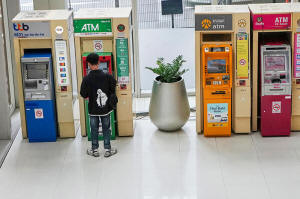|
The
new measure aims to curb financial fraud by preventing criminals
from receiving and transferring a large amount of money at one
time, and enabling timely freezing of illicit funds in order to
increase the chances that victims will be able to recover at
least some of their money, according to Daranee Saeju, the
bank's assistant governor for Payment Systems Policy and
Financial Consumer Protection.
The daily transfer limit will be applied to transfers in three
different tiers: under 50,000 baht ($1,537), under 200,000 baht
($6,147) and above 200,000 baht ($6,147), depending on each
customer’s risk profile and the banks’ assessment under
know-your-customer, or KYC, rules.
Customers with established records of responsibility can
continue transferring at their usual levels.
This measure will be implemented for new mobile banking and
internet banking customers by the end of this month and for
existing customers by the end of this year.
Thailand has around 12 million mobile banking users, according
to a report Wednesday in the Bangkok Post newspaper. It said
previous central bank safeguards capped mobile banking transfers
at 50,000 baht ($1,537) per transaction — with facial
recognition required — and 200,000 baht ($6,147) per day in
total.
In June alone this year, 24,500 scam cases related to money
transfers were reported to the authorities, causing total losses
of 2.8 billion baht ($86.1 million) — an average of 114,000 baht
($3,504) per case. The largest single fraudulent transfer
amounted to 4.9 million baht ($150,591), the Post reported,
citing the central bank.
On average, scammers needed only three minutes to siphon off
half of the stolen funds, while victims typically took 19–25
hours to report the crime, the newspaper reported.
For the first six months of this year, children under 15 were
involved in 78,468 financial scam cases, while victims over 65
years of age accounted for 416,453 cases, it said.
All contents © copyright 2025 Associated Press. All rights reserved

|
|




